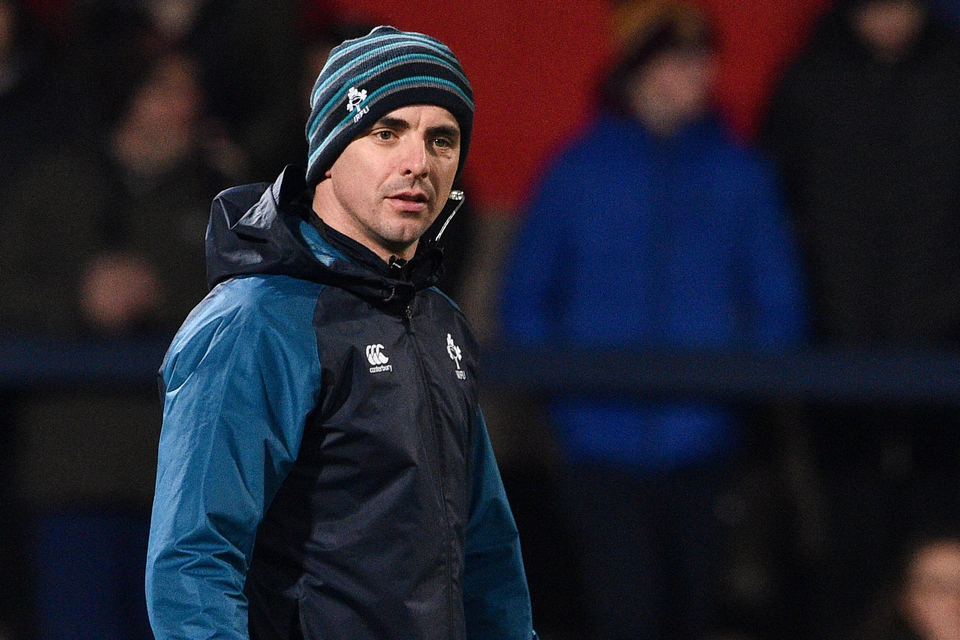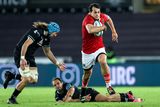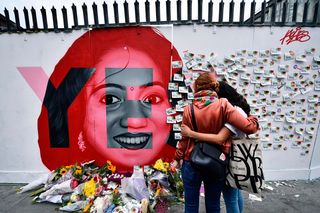10.30am kick-offs and five games in 18 days - Ireland's U20 World Cup schedule is as mad as it is bad
Ireland under-20 head coach Noel McNamara. Photo: Matt Browne/Sportsfile
At the ungodly hour of 10.30 yesterday morning, Ireland Under 20s played a practice game against a Munster Development side in Thomond Park.
Its timing was related to what awaits the squad in the World Rugby Under 20 Championship in Argentina next month. They will play Australia second up at that hour. And then Italy, at the same time, in game three. If that seems a bit of an imposition, it is, but a minor detail in the whole programme, a schedule which is as mad as it is bad.
It seems like another lifetime now that we were having a frank exchange of views with then IRFU rugby director Eddie Wigglesworth about the negative effect of provincial ‘A’ games rugby on the AIL. Not an inch. Which had been exactly his position a few years before on what then was the Junior World Cup — ie, that five games in 16 days of summer was a great idea.
It was insane, a situation rendered worse by the almost inescapable: Ireland would be having their asses handed to them on a plate every time they came up against England, France, New Zealand, South Africa or Australia. Each of them had access to either vastly superior numbers, a broad cultural mix of athletes, or both. Mostly it made for painful viewing as the skinny white boys in green got biffed about the place by men of many races.
The madness has shifted only a couple of points along the scale since then. In 2012, in a moment of great kindness the International Rugby Board — as World Rugby was then known — stretched the schedule out to its current 18 days, and increased the size of the squads from 26 to 28. Cheers lads. If that was recognition that the original toll was crazy then the solution didn’t get beyond acknowledging the problem.
Ask yourself why the big boys’ World Cup aims for a week between games; managed by squads of 31; and when you fail to qualify for the knockouts you’re allowed to go home and lick your wounds.
Perhaps the cruellest twist of the Under 20s version is that you have to complete five games regardless of the damage you have suffered in your three pool outings. This is a throwback to the days when lads of this age were stuck for games and needed the exposure. Yes, these games score towards rankings for the following year’s tournament, but figure out a better way.
“It’s a special experience,” maintains current Connacht backs coach Nigel Carolan. A veteran of six tournaments, he managed Ireland in 2016 when they stunned everyone by beating New Zealand en route to the final. He has seen it from every angle.
“Yes, there is a cruel and barbaric nature to playing so many games in such close proximity, and if you’re in the lower ranks then the last week really drags when all you’re thinking about is the plane home. But you do find out about yourself and your ability. It does give you a small taste of what life as a pro could be about. And you find out about players, not only on the pitch but off it as well in the way that they cope. It’s savage and it’s brutal, but that’s what you sign up for.”
So why not come up with a more appropriate model? Would you believe it, cash.
Naturally enough, the longer the tournament, and the bigger the squads, the more bills there are to be paid. But if you recognise that virtually the only difference between Under 20 rugby and Test rugby is the age of those playing — the intensity of the 20s version is savage — then you appreciate it’s either worth doing properly, or else coming up with an alternative.
The Ireland team next month will be based in Santa Fé for the three pool games, which will decide their fate in the remaining two rounds in Rosario. We remember spending a few days in Santa Fé back in 2007, coincidentally another World Cup year. Ireland played the first of two losing Tests there — the second in Rosario. It had sounded nice. We would make the long road trip north west from Buenos Aires, savouring the beauty of the farmland that produced such world-class beef, and maybe stopping off in a winery for a glass of robust red. Jaysus. Not even close. Sante Fé itself was equally grim. We checked last week with an Argentine colleague if the city had improved any in the last dozen years. “No,” he said. “It’s still a shit hole. Unless you like fishing!”
That stuff matters on tour. Seemingly one of the failings of Ireland’s Under 20 World Cup campaign last year in France was the unwavering intensity of camp life. Of course the results didn’t help, and by the time they played Japan in the last game, the prospect of defeat, and relegation to the lower tier, obsessed all concerned. But according to some of those involved on the trip, the off-button was impossible to find from the moment they assembled. High performance and high stress are not good pals.
You may wonder where in the day or night the lads might find time to unwind, but it doesn’t have to be a no-holds-barred piss-up. Neither, however, should it involve staring into a computer screen until you’re losing the will to live. What awaits these lads will be brutal. The run of the mill has already cost them four front-liners — Scott Penny, David Hawkshaw, Harry Byrne, and Conor Philips — of the six extras included in last week’s squad of 34 you’d expect half of them to travel at some stage.
As Nigel Carolan suggests, some will thrive in the adversity, but you could yomp them over the Curragh blindfolded for a fraction of the price. Give the tournament the time and numbers it deserves, or drop it.















